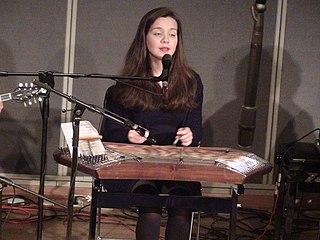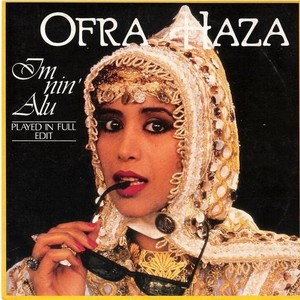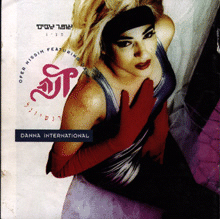
Ofra Haza was an Israeli singer, songwriter, and actress, commonly known in the Western world as "the Madonna of the East", or "the Israeli Madonna". Her voice has been described as a "tender" mezzo-soprano. In 2023, Rolling Stone ranked Haza at number 186 on its list of the 200 Greatest Singers of All Time.
The music of Israel is a combination of Jewish and non-Jewish music traditions that have come together over the course of a century to create a distinctive musical culture. For almost 150 years, musicians have sought original stylistic elements that would define the emerging national spirit. In addition to creating an Israeli style and sound, Israel's musicians have made significant contributions to classical, jazz, pop rock and other international music genres. Since the 1970s, there has been a flowering of musical diversity, with Israeli rock, folk and jazz musicians creating and performing extensively, both locally and abroad. Many of the world's top classical musicians are Israelis or Israeli expatriates. The works of Israeli classical composers have been performed by leading orchestras worldwide.
Sephardic music is an umbrella term used to refer to the music of the Sephardic Jewish community. Sephardic Jews have a diverse repertoire the origins of which center primarily around the Mediterranean basin. In the secular tradition, material is usually sung in dialects of Judeo-Spanish, though other languages including Hebrew, Turkish, Greek, and other local languages of the Sephardic diaspora are widely used. Sephardim maintain geographically unique liturgical and para-liturgical traditions.

"Jerusalem of Gold" is an Israeli song written by Naomi Shemer. Often contrasted to Israel's national anthem, Hatikva, the original song expressed the deep longing of many Jews to return to Jerusalem's Old City and eastern areas. These areas had been inaccessible to Jews after the 1948 Palestine War, when the city was divided and East Jerusalem came under Jordanian control. Following Israel's victory in the Six-Day War, Shemer added a final verse to commemorate the city's reunification under Israeli control and the restored Jewish access to its holy sites.

Mizrahi music refers to a music genre in Israel that combines elements from the Middle East, North Africa, and Europe; and is mostly performed by Israelis of Mizrahi Jewish descent. It is usually sung in Modern Hebrew, or literary Hebrew.

Areti Ketime is a Greek singer and santur player. She sings traditional Greek songs of various music genres.

Liel Kolet is an Israeli singer-songwriter and a peace advocate.

The Kdam Eurovision, in short known as the Kdam was the Israeli national preselection of the Eurovision Song Contest. The competition was first introduced in 1981 and ran until 2014.

"Im Nin'alu" is a Hebrew poem by 17th-century Rabbi Shalom Shabazi. It has been set to music and sung by Israeli singer Ofra Haza and others. Haza first performed this song with the Shechunat Hatikva Workshop Theatre, appearing on television on IBA's General Television in 1978. The original version was included on the 1984 album Yemenite Songs, also known as Fifty Gates of Wisdom. The remixed version was part of her international debut album Shaday of 1988.

Glykeria is a Greek singer active in Greece and Cyprus, while also gaining fame in Israel, France, Turkey, Spain, and England. Her career has spanned over 30 years and is marked by several multi-platinum releases. On 14 March 2010, Alpha TV ranked Glykeria the third top-certified female artist in the nation's phonographic era.

Danna International (Offer Nissim Presents) is the first album by Israeli singer Dana International, released in 1993. In her early days it was common to see her first name spelt "Danna". The album's catalogue number is IMP Dance 1993 - IMP 2004, although quite a few copies of the album misprint the catalogue number as "IMP 4004" on the CD label.

Free is the fifth studio album by Israeli singer Dana International, released in 1999, the year after she won the Eurovision Song Contest 1998 with the song "Diva"; it includes an alternative version of the track. The album was produced by Dutch production team Bolland & Bolland with additional production and remix by influential Israeli DJ Offer Nissim.

Shaday is an album by Israeli singer Ofra Haza, released in 1988. Shaday, recorded in both Tel Aviv and England, became Haza's international breakthrough album and includes the Hebrew-English language remix singles "Im Nin'alu" and "Galbi," as well as "Shaday" and "Da'Ale Da'Ale," also released as remix singles.

Nurit Hirsh is an Israeli composer, arranger and conductor who has written over a thousand Hebrew songs. Three of her most famous and widely known songs are Ba-Shanah ha-Ba'ah, Oseh Shalom bi-Meromav. and A-Ba-Ni-Bi, the winning entry in the 1978 Eurovision Song Contest.

Greek music in Israel is very popular and Greek musicians often visit Israel while on world tours. Popular Greek singers who have performed in Israel include Manolis Angelopoulos, Eleftheria Arvanitaki, George Dalaras, Haris Alexiou, Glykeria, Nikos Vertis and Natassa Theodoridou. In December 2012 Natasa Theodoridou performed some of her songs in Tel Aviv Performing Arts Center in Hebrew. In 2007 during the interview of Shimon Peres by Hellenic Broadcasting Corporation on George Dalaras concert in Israel, President Shimon Peres stated: "In Israel we love the Greek Music. For us Greece is a country but also a melody".
Israel was represented at the Eurovision Song Contest 1983 with the song "Hi" (חי), composed by Avi Toledano, with lyrics by Ehud Manor, and performed by Ofra Haza. The Israeli participating broadcaster, the Israel Broadcasting Authority (IBA), selected its entry for the contest through Kdam Eurovision 1983.
Ela San To Tzivaeri,' Έλα σαν το τζιβαέρι is a Greek folkloric song (Tsifteteli). The meter is 4
4. Its music was composed Greek Vasilis Kazoulis. Greek lyrics written by Vasilis Kazoulis.
"Kol Ha'Olam Kulo" is a Hebrew language song by Orthodox Jewish rabbi Baruch Chait adapted from the epigram attributed to the Hasidic rabbi Nachman of Breslov, "The whole entire world is a very narrow bridge and the main thing is to have no fear at all". Israeli singer Ofra Haza also performs a popular version of the song. The lyric is based on an excerpt from Likutei Moharan II #48.

Rachel Shapira is an Israeli songwriter and poet. She rose to prominence after the Six-Day War with her anti-war song "Mah Avarekh", set to music by Yair Rosenblum, and went on to write some of the "greatest classics" of Hebrew song. Her songs have been set to music by leading Israeli composers and performed by top Israeli artists.

Avraham Tal is an Israeli singer, musician, and musical producer. Tal was the lead singer and writer in the popular Israeli band "Shotei Hanevuah" from 1998 until its breakup in 2007. Among the well-known songs which he wrote while in the band are "Mi" and "Kol Galgal".














